On Air Now
The Chris Moyles Show 6:30am - 10am
26 February 2025, 15:24 | Updated: 26 February 2025, 16:56
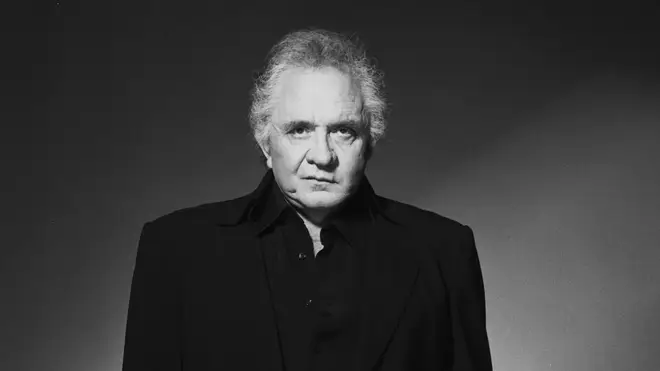
The Man In Black gained a whole new generation of fans when he covered a track by Nine Inch Nails. How did this 70-year-old country star end up performing a Trent Reznor song?
Johnny Cash had a long and eventful career before he recorded Hurt in 2002, but it's up there with some of his most memorable performances of all time.
We look back at his cover of the Nine Inch Nails track and what led him to that point.
Watch Johnny Cash's video for Hurt:

Johnny Cash - Hurt
Born J.R. Cash in Kingsland, Arkansas on 26th February 1932, the musician signed to the legendary Sun Records in the mid-1950s and forged a hugely-successful career as a country singer with hits like I Walk The Line and Folsom Prison Blues.
Cash recorded more crossover hits like Ring Of Fire and the novelty A Boy Named Sue, which was recorded live in front of a crowd of inmates at San Quentin Prison, California in 1969.
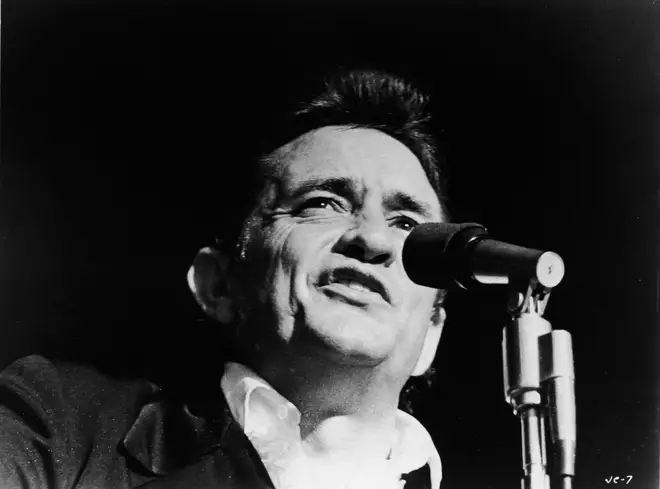
Known as “The Man In Black” not only because of the way he dressed but because of his “outlaw” image, by the 1970s and 80s, Cash was as known for his film and TV acting appearances as his music.
Come 1991, Cash had been dropped by his record company, but a new wave of artists were paying tribute. He joined Krist Novoselic of Nirvana for a Willie Nelson tribute album and voiced a mystical coyote in an episode of The Simpsons.
When Cash appeared on U2’s 1993 album Zooropa providing vocals for the track The Wanderer, he came to the attention of producer Rick Rubin, who was looking for acts for his American Recordings label.
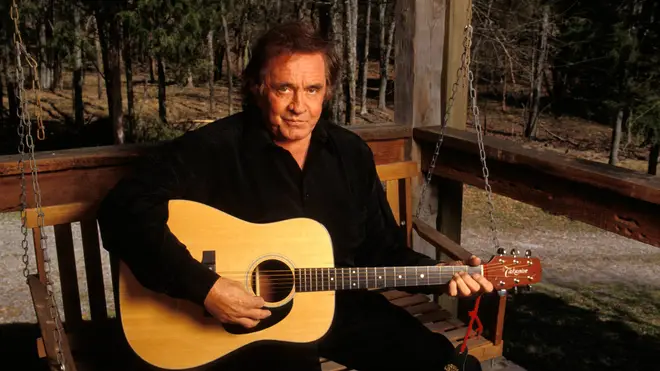
Rubin - then best known for his work with Beastie Boys, Public Enemy and Run DMC among many others - sat Cash down in his own living room and recorded the country legend performing songs with just an acoustic guitar.
Their first stripped-back collaboration was called simply American Recordings and featured songs written by Cash himself, plus songs by Tom Waits and Leonard Cohen. The album gave Cash some of the best reviews of his career.
Cash and Rubin did it all again in 1996 for American II: Unchained featuring songs by Beck, Soundgarden and Tom Petty, while American III: Solitary Man (2000) saw Cash cover U2’s One and Nick Cave’s Mercy Seat.
This template of Cash recording raw, solo versions of modern set the stage for American IV: The Man Comes Around, released on 5th November 2002. It turned out to be the final album released before Cash’s death on 12th September 2003.
The track listing reflected Rick Rubin’s input as Cash delved into songs that were standards (Bridge Over Troubled Water, originally recorded by Simon & Garfunkel, Lennon & McCartney’s In My Life and the traditional Irish ballad Danny Boy) and newer, more “alternative” material.
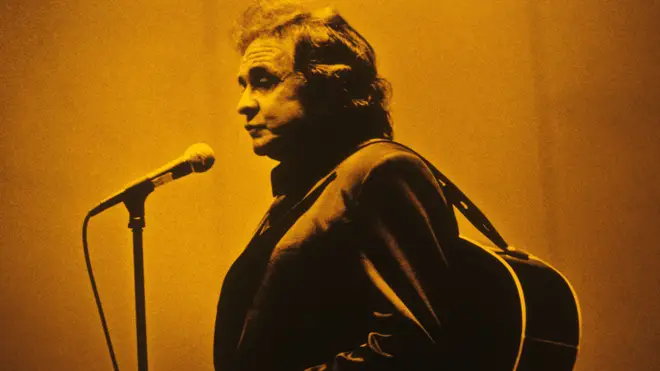
Rubin enlisted Chili Peppers’ John Frusciante to rework Depeche Mode’s Personal Jesus to suit Cash’s style, but it was another cover that drew the attention of fans and critics.
In 2002, Trent Reznor had released three albums with his industrial rock band Nine Inch Nails. The second LP was 1994’s The Downward Spiral, a gruelling concept album that tells the story of a character’s descent into darkness.
The finale is Hurt: a brutal depiction of self-loathing and emotional numbness that begins “I hurt myself today / To see if I still feel.”
Rubin had sent the song to Cash before, but the veteran musician couldn’t hear beyond the industrial noise and anguished howl that featured in the original. “I think it was hard for him to hear it,” Rubin told Rolling Stone. “So I sent him the lyrics. I said, ‘Just read the lyrics. If you like the lyrics, then we'll find a way to do it that will suit you’.”

Nine Inch Nails - Hurt
But Cash was convinced by Rubin’s belief in the song and agreed to try recording it at the producer’s home in LA. The musician was suffering from autonomic neuropathy brought on by diabetes and by the time he recorded Hurt, his health was failing. “There were times when his voice sounded broken,” said Rubin. “He tried to turn that into a positive in the selection of the music. It was a real struggle for him.”
Instead of being a song about a young individual on the downward spiral to self-destruction, Cash interpreted the lyrics as a man at the end of his life. The result is heartbreaking as the veteran musician sings in a quavering, emotional voice: “If I could start again / A million miles away / I would keep myself / I would find a way.”
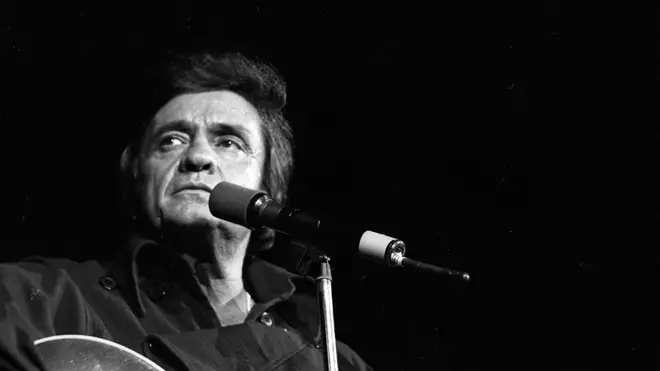
Reznor told Alternative Press in 2004 his reaction to Rubin’s call suggesting the Man In Black cover his song: “I was flattered, but frankly, the idea sounded a bit gimmicky to me."
The musician was confused by the final result. “It sounded... weird to me,” he remembered. “It felt very strange hearing the highly identifiable voice of Johnny Cash singing it. I certainly wasn't cringing or anything, but it felt like I was watching my girlfriend f**k somebody else.”
Reznor’s opinion changed when he finally saw the video that director Mark Romanek had produced for the song. It shows Cash performing the song in the derelict House Of Cash museum, a building dedicated to the life of the country superstar. He’s literally surrounded by his memories.
The Nine Inch Nails frontman played the video - by the end he was in pieces: “Tears welling, silence, goose-bumps... Wow. I just lost my girlfriend, because that song isn't mine anymore.
“It really made me think about how powerful music is. I wrote some words and music in my bedroom as a way of staying sane, about a bleak and desperate place I was in.
“Somehow that winds up reinterpreted by a music legend from a radically different era and still retains sincerity and meaning - different, but every bit as pure.”
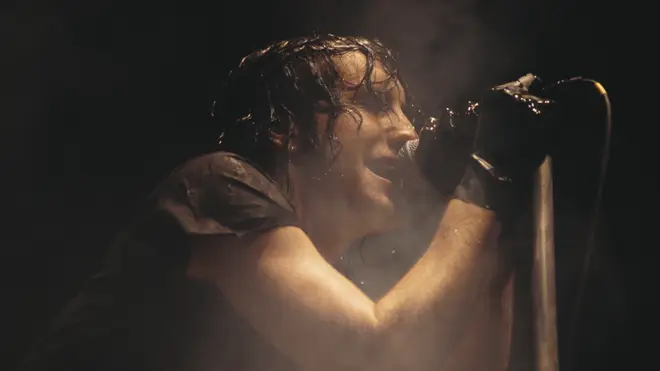
The video was shot in bitterly cold weather in Nashville in February 2003. Three months later, June Carter Cash, the musician’s wife of 35 years, died. Johnny Cash himself died on 12 September 2003, just under a year after the release of American IV.
The album was the first Johnny Cash studio LP to achieve Gold status in the US for more than thirty years. In the UK, Hurt only made Number 39 in the singles charts, but the single continues to stun listeners to this day.
Read more: